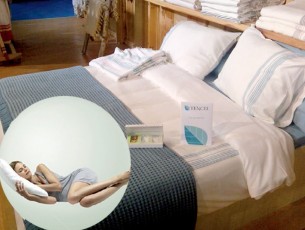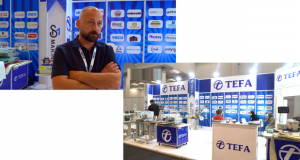Botanic mattresses of Lenzing come with excellent yarns. With Lenzing fibers you immediately feel it: they come from Nature itself. There is a piece of Nature in every product made of Lenzing fibers, and they accompany the user all day long.
The Botanic Bed
The applications for TENCEL® are exceptionally versatile. The fiber can be used in every aspect of sleeping – beginning with mattresses and mattress pads to bed covers and linens, all the way to lingerie. TENCEL®’s universality makes it possible to enjoy a completely botanic bed from nature. Nothing is dreamier than that when you go to sleep in a botanic TENCEL® bed.
Climate-dependent
In the bed environment, moisture transport is determined by the climate in the room. In accordance with climate conditions, TENCEL® quickly absorbs and then releases moisture back into the environment. Compared to other filling materials for bed covers, TENCEL® demonstrates the highest moisture absorption. Tests show that TENCEL® still has free range to transport moisture away from the body at a humidity of 65 %.
TENCEL® exceptionally has the ability to absorb moisture when the air humidity rises.
No habitat for microorganisms
Perfect Moisture Management also puts a stop to the unrestricted growth of mites in bedding. Research conducted on mattresses (polyurethane foam with integrated TENCEL® powder) showed that a large portion of the applied mite population died off. With conventional products, the number of mites increased 17 times in a 6 week period. The concentration of mites drastically declines due to TENCEL®’s management.
TENCEL® stores moisture and mites die out. Due to the perfect moisture management of TENCEL® mites die out.
The most sensual use for TENCEL® in the bed is in bed linen. Bedlinen gets in direct contact with the skin and has to guarantee well being during the sleep.
TENCEL® fulfills dreams thanks to its moisture management and skin friendliness. The TENCEL® fiber is used successfully in numerous applications in bedding – starting with mattresses to basic bedding and bed linens. This fiber is quite simply a dream come true.
TENCEL® is the lyocell fiber from the house of Lenzing. It is of botanic origin, since it is extracted from the raw material wood. Fiber production itself is extremely ecofriendly, due to the closed loop system. On the day that the fiber TENCEL® was invented, a new chapter was written in the history of fibers. Textiles of TENCEL® are more absorbent than cotton, softer than silk and cooler than linen.
Botanic Fiber
TENCEL® comes from nature and makes use of photosynthesis which has, since the beginning of time, been an important mechanism in nature and the basis for life on earth. In photosynthesis the energy from the sun is absorbed by various dyestuffs, primarily green chlorophyll, and converted into chemical energy. In this respect, the starting products of carbon dioxide and water are converted into dextrose and oxygen. The more TENCEL® fiber you have, the more oxygen.
Pure Sensuality
TENCEL® bed linen is extremely smooth and ensures body-hugging well-being. The smooth fiber structure is responsible for the silky hand of TENCEL® bed linen and gives the dream fabrics a natural sheen. Softness coupled with sensuality lead to such stuff, as dreams are made on.
Beauty as you sleep
TENCEL® pampers your skin like a night cream. The skin-sensory properties of moisture management and skin friendliness mean that TENCEL® guarantees a well balanced skin climate. Even as you sleep your skin can breathe and rejuvenate when covered with TENCEL®.
Ecological production
Conserve resources
A life cycle analysis demonstrates the eco-friendliness of the fiber TENCEL® in comparison to cotton, polyester and polypropylene. The study evaluates all the environmental impacts in the course of extracting the fiber and arrives at the conclusion that cotton’s toxic impact on fresh water and soil is enormous in comparison to TENCEL® fibers. Another ecological advantage of TENCEL® is that the raw material wood, stems from forest plantations which practice sustainability. The cultivated forestland is not suitable for agriculture. In contrast, cotton uses productive agricultural land, which means it is competing with food production. Moreover, water consumption is 10 – 20 times lower than with cotton.*
Closed loop
Certified
The production of TENCEL ® is revolutionary. The production process is based on a solvent spinning process which represents the greatest achievement in cellulose fiber technology. More than 100 Lenzing patents have been granted at the international level for the invention of TENCEL ®. The unique closed loop process makes TENCEL® the fiber of the future since the solvent used is recycled by almost 100% in the closed loop process. This special process received the “European Award for the Environment” from the European Union.
 SleepTech Magazine Mattress, Accessories, Machinery, Raw Materials
SleepTech Magazine Mattress, Accessories, Machinery, Raw Materials




2 yorum
Geribildirim: What Is The Softest Blanket? – Erickkasysavane
Geribildirim: What Is The Most Beautiful Fabric? – Almazrestaurant